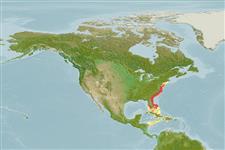>
Eupercaria/misc (Various families in series Eupercaria) >
Sciaenidae (Drums or croakers)
Etymology: Cynoscion: Greek, kyon = dog + Greek, odous = teeth + Greek, skion, skiaina = barbel, red mullet (Ref. 45335).
More on author: Cuvier.
Environment: milieu / climate zone / depth range / distribution range
Ecología
marino; salobre demersal; no migratorio (Ref. 94474); rango de profundidad 10 - ? m (Ref. 9988). Subtropical; 42°N - 15°N, 83°W - 70°W (Ref. 94474)
Western Atlantic: New York to southern Florida in USA and the entire Gulf of Mexico. Northeastern Atlantic: recently reported from Guadalquivir River estuary in Spain (Ref. 94474).
Length at first maturity / Tamaño / Peso / Age
Maturity: Lm 26.8, range 25 - 35 cm
Max length : 100.0 cm TL macho / no sexado; (Ref. 40637); common length : 36.0 cm TL macho / no sexado; (Ref. 3702); peso máximo publicado: 7.9 kg (Ref. 40637); edad máxima reportada: 18 años (Ref. 12193)
Espinas dorsales (total) : 9 - 11; Radios blandos dorsales (total) : 25 - 28; Espinas anales: 2; Radios blandos anales: 10 - 11. Body silvery, dark grey on back with bluish reflections and numerous round black spots irregularly scattered on upper half, extending to dorsal and caudal fin. Spinous dorsal fin dusky, other fins pale to yellowish. Mouth large, oblique lower jaw projecting. Upper jaw with a pair of large canine-like teeth at tip. Lower jaw with an enlarged inner row of teeth, uniform in size and closely set. Chin without barbels or pores. Snout with 2 marginal pores. Gas bladder with a pair of nearly straight horn-like appendages. Soft portion of dorsal fin unscaled (Ref 51721).
Inhabits river estuaries and shallow coastal marine waters over sand bottoms, often associated with seagrass beds. Also occurs in salt marshes and tidal pools of high salinity. Feeds mainly on crustaceans and fishes. An important food and sport fish throughout its range. Utilized fresh for steaming, broiling and baking (Ref. 9988).
Robins, C.R. and G.C. Ray, 1986. A field guide to Atlantic coast fishes of North America. Houghton Mifflin Company, Boston, U.S.A. 354 p. (Ref. 7251)
IUCN Red List Status (Ref. 130435)
Threat to humans
Harmless
Human uses
Pesquerías: comercial; pesca deportiva: si
Herramientas
Special reports
Download XML
Fuentes de Internet
Estimates based on models
Preferred temperature (Ref.
123201): 12 - 26.7, mean 24.3 °C (based on 88 cells).
Phylogenetic diversity index (Ref.
82804): PD
50 = 0.5000 [Uniqueness, from 0.5 = low to 2.0 = high].
Bayesian length-weight: a=0.00813 (0.00502 - 0.01317), b=3.05 (2.92 - 3.18), in cm total length, based on LWR estimates for this species & Genus-body shape (Ref.
93245).
Nivel trófico (Ref.
69278): 4.0 ±0.66 se; based on food items.
Generation time: 5.8 (4.0 - 6.7) years. Estimated as median ln(3)/K based on 13
growth studies.
Resiliencia (Ref.
120179): Medio, población duplicada en un tiempo mínimo de 1.4-4.4 años (K=0.2-0.3; tmax=18; tm=1; Fec=1 million).
Prior r = 0.69, 95% CL = 0.46 - 1.04, Based on 1 data-limited stock assessment.
Fishing Vulnerability (Ref.
59153): High vulnerability (58 of 100).
Climate Vulnerability (Ref.
125649): High vulnerability (60 of 100).
Nutrients (Ref.
124155): Calcium = 43.1 [25.3, 82.0] mg/100g; Iron = 0.771 [0.408, 1.320] mg/100g; Protein = 19.1 [17.7, 20.8] %; Omega3 = 0.33 [0.20, 0.51] g/100g; Selenium = 30.9 [16.5, 56.8] μg/100g; VitaminA = 9.52 [3.34, 29.64] μg/100g; Zinc = 0.667 [0.495, 0.966] mg/100g (wet weight);
